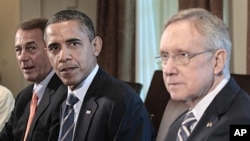President Barack Obama says he had "constructive" talks with congressional leaders at the White House Thursday seeking a compromise to reduce government deficits and allow raising the federal borrowing limit. But, Mr. Obama says differences remain on a wide range of issues.
Mr. Obama said he and the eight Republican and Democratic leaders discussed "various options" and reaffirmed the importance of raising the federal debt limit to avoid a government default.
He said all acknowledged that debt and deficits issues needs to be solved now, adding that House and Senate lawmakers need to work hard before the August 2 deadline established by the Treasury Department to avoid a federal default on obligations.
"Nothing is agreed to until everything is agreed to, and the parties are still far apart on a wide range of issues," said President Obama. "But all the leaders came in a spirit of compromise and a spirit of wanting to solve problems on behalf of the American people."
The president says White House and congressional staffs will work over the weekend, and he is bringing leaders back to the White House on Sunday to begin "hard bargaining" to get a deal done.
Mr. Obama signaled earlier this week that he believed conditions are right for a broader deficit reduction package, what he called "something big". This could involve as much as $4 trillion in deficit reductions over at least 10 years.
The White House says such a plan could involve savings in the government's Medicare and Medicaid programs, which Democratic lawmakers are fiercely protective of, and reducing rising costs in the Social Security system.
Press Secretary Jay Carney repeatedly avoided getting into specifics about any progress, and declined to say whether the discussions became contentious at any point. He also responded to what he called "misperceptions" conveyed by some media reports that Mr. Obama has made Social Security a major bargaining chip.
"Social Security is not a contributor to our short and medium term deficit problem, so when you are building a plan to deal with your short and medium term deficit problem, Social Security is not an issue," said Carney.
On Capitol Hill late Thursday, one participant in the talks, House Minority Leader Nancy Pelosi, said House Democrats reject any reductions in benefits Americans receive from Medicare or Social Security.
"Do not consider Social Security a piggy bank for giving tax cuts to the wealthiest people in our country," said Pelosi. "We are not going to balance the budget on the backs of America's seniors, women and people with disability."
Earlier, House Speaker John Boehner called dealing with short and long term debt problems critically important, but he and other Republicans reiterated their opposition to tax increases and eliminating certain loopholes benefiting wealthier Americans.
"We are not going to raise taxes on the American people," said Boehner. "We are not going to raise taxes on the very people that we expect to re-invest in our economy and to help grow jobs."
The House Majority Leader, Republican Eric Cantor, said talks were beginning their "final stage" and referred to progress made in an initial series of negotiations led by Vice President Joe Biden.
"There was a blueprint on the table where there could be over $2 trillion in savings," said Cantor.
Ultimately, a compromise will include elements of Mr. Obama's own proposals, those from Democrats and Republicans, and the recommendations of two bipartisan independent commissions.
In a statement Thursday, the co-chairs of one of those panels, Alice Rivlin and former Senator Pete Domenici, urged lawmakers to "put aside partisan theatrics" and reach a deal that includes revenues, government entitlement programs and annual spending.
Press Secretary Carney told reporters that no single plan will end up being the ultimate compromise that agreed upon. As for the negotiations ahead of the August 2 debt ceiling deadline, Carney said "we are in the end game."
US Debt Talks 'Constructive', Significant Differences Remain
- By Dan Robinson





